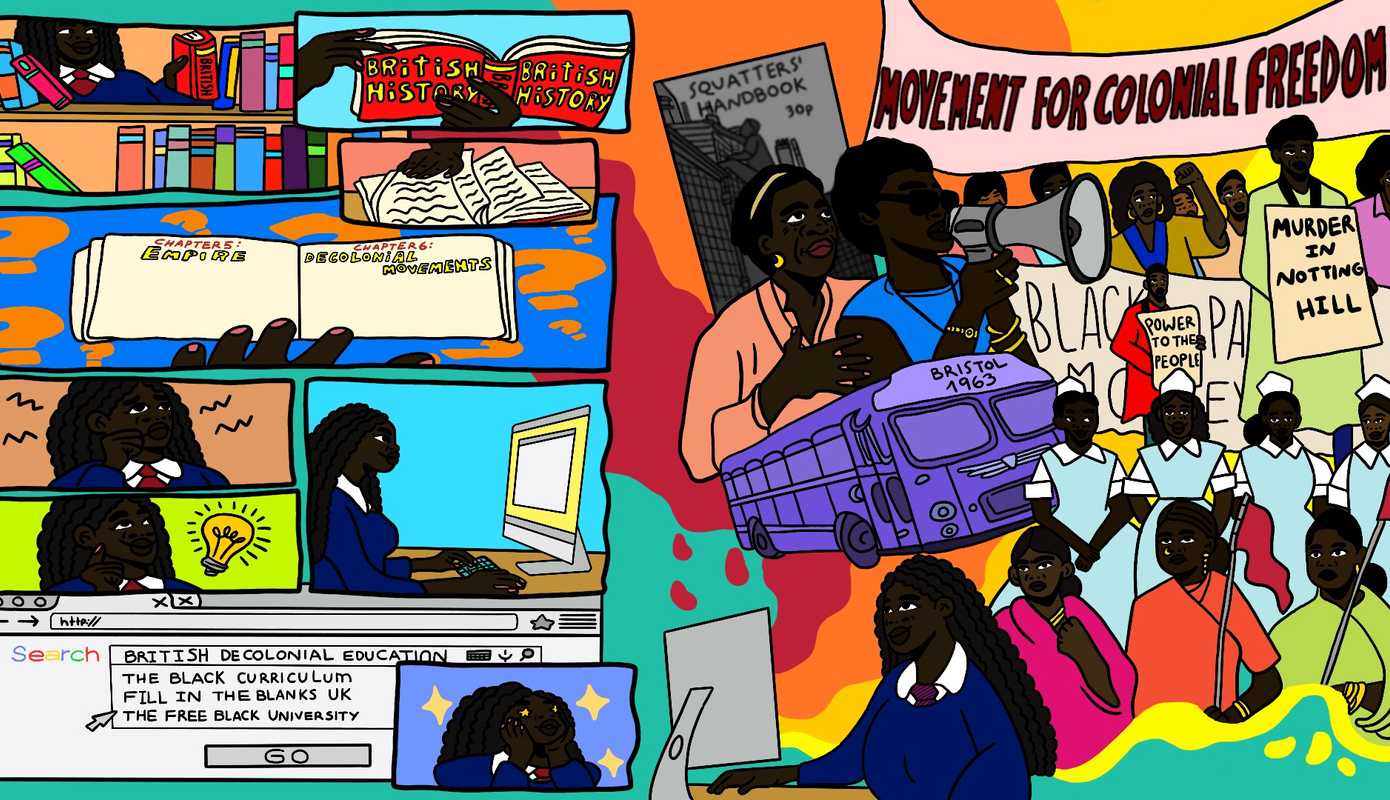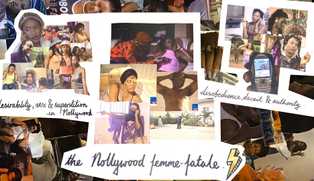The illustration in this article was made possible by donations to the Black Creatives Fund. Donate now.
The call to decolonise public education in Europe and America was at the forefront of last year’s iteration of the Black Lives Matter movement.
In the UK, these demands have been systematically ignored by the current Tory government. Last June, education secretary Gavin Williamson rejected petitions calling for a revised curriculum that accurately depicted the violent consequences of colonialism and Britain’s role in the slave trade, saying that the UK “should be incredibly proud of our history.”
For Black activist groups in the UK, the lack of government support has been neither a surprise nor a deterrent, serving only to highlight the important role that education plays in maintaining systemic racism. The challenge they now face is how to achieve the structural change that will make public education a force in dismantling racial prejudice.
“I do think we can move from the post-Brexit xenophobia into a society that is more equitable,” said Lavinya Stennett, founder and CEO of The Black Curriculum, when I spoke to her last year. “I don’t see that necessarily coming from the government, but instead from the people sustaining these conversations.”
The Black Curriculum is one of many organisations in the UK committed to changing how the school syllabus discusses Britain’s colonial past and multicultural present. The inspiration came from Stennett’s year abroad in New Zealand where she witnessed how Maori indigenous culture and history were part of the education programme. Stennett’s experience made her reflect on how comparatively little she was taught about her roots and history back home. “I was constantly learning back in New Zealand, and I just didn’t feel like I had that education in London.”

After conducting a few focus group sessions to gauge if this was a shared experience, Stennett decided to found The Black Curriculum in January 2019 with the aim of creating a bespoke curriculum program for schools to engage with.
“I like to see our curriculum as one about experiences and events rather than one that gives the appearance of history that existed in a vacuum,” she said. The Black Curriculum’s programs encourage young students to think about history in terms of connections. Covering themes like immigration, politics and art history, the emphasis is on charting how the events of the past have shaped contemporary society.
“It’s more about thinking how we can reconcile the events that exist today with the past,” she added. “I think that’s what’s missing from the current curriculum that we have: showcasing how the Black British experience, from migration to empire to culture and equality struggles, is part of the history of this country.”
This is radically different to the existing school syllabus; on the rare occasions that schools opt to include Black history, it is always brief and purposefully disconnected from present-day issues. Connecting the dots, however, is crucial for young students. “I know it sounds really cliché, but they are literally going to be the leaders of society in the next twenty years,” Stennett said. “We’re teaching them about a society that they can actually shape.”

Fill in The Blanks UK, a team of South London sixth form students from former British colonies, has been actively campaigning to change the school curriculum to include teaching about Empire. The online petition they started last year was signed by more than 250,000 people.
“Teaching colonial history is not just for the students whose families had to endure the rule of Britain, it’s also for the white British students who now benefit from these legacies,” said Matilda Marcus, a member of the group. “For anyone in Britain, imperial history is everyone’s history.”
Meanwhile in higher education, less than 1% of UK university professors are Black, and their student bodies demonstrate a similar historic lack.
“We don’t believe the university [as an institution] can ever be fully decolonised because of its origins,” said Melz Owusu, founder of the Free Black University. Owusu, a campaigner and Cambridge PhD student, came to this conclusion after more than five years of work as a student education officer. “It was the Rhodes Must Fall movement in Oxford that sparked things off,” they explained. “I just recognised the pattern in all these Black student accounts and experiences; it’s all a trick.”
Read more | Rhodes’ Legacy: From Dylann Roof to Oxford
There are eleven statues of Rhodes and hundreds more of men who hated Africans, yet Oxford stays beautiful even as something creeps beneath my skin…
The “trick” was the implementation of diversity schemes instead of an active engagement with decolonisation. The former prioritises short term tokenistic changes over more long-term and structural transformations. Any recent progress toward tackling racial inequality in higher institutions has been almost entirely halted by the pandemic, and a deep apathy on the part of the Department of Education. Worse still, the word “decolonisation” has been turned into a handy phrase by university administrators to mask funding cuts, as evidenced by the University of Leicester’s recent decision to drop its English Language and Medieval Literature programmes. Rather than accounting for increased staff redundancies and smaller student populations in its official justification for cutting these programmes, the university claimed the move was part of “decolonising” its syllabus.
“How I understand decolonisation is that it is about reconciling the legacy of colonialism with today. And understanding that different experiences in the same structure exist, and then working towards a more equal one,” said Stennett. An effective understanding of contemporary injustices requires an honest discussion about the colonial past; a tall order for a country like Britain which continues to cling on to the idea that the colonial conquest benefited the colonised.
“Full decolonisation is a change that comes in many forms, and fundamentally it’s trusting young people with the full truth of Britain’s past,” Marcus said. “It’s also long overdue for the government to acknowledge the legacies of Britain’s abhorrent history.”

Owusu is more cautious about the progressive potential of decolonisation. “Decolonial thought is not something that is new just because the media is now talking about it,” they explained. “‘Decolonising’ institutions will become as superficial as ‘diversity’ did; just the same homogenised power structure.” In other words, overusing and misusing the term in public discourse will ultimately render it symbolic and not radical at all.
The Free Black University, rather than focusing on decolonising higher education, aims to “produce decolonial knowledge, untethered from a colonial space,” said Owusu.
This knowledge comes in a variety of accessible content forms; from an eLibrary, to an upcoming podcast, regular journals, lectures, and teaching seminars. Mental wellbeing services are also a key service the Free Black University provides, something Owusu argues is inseparable from their main vision. “In order to create radical thought, we need our communities to be mentally well. We exist within structures imagined by racist white men and reified across centuries; that immobilises us from believing in the possible.”
Despite the current challenges, all three groups are optimistic for the future. “We’re a new organisation that is focusing on being here for the long-term,” said Owusu. “So, we’re being a bit quiet about what we’re working on for sustainability sakes, but things are going really well behind the scenes.”
“We’re so proud to be building a national coalition with other great people and organisations working on this cause,” said Marcus. “Whilst we aren’t all fighting for the exact same thing, we all want to work, and ultimately win, together.”
It is important that all people in the UK understand the realities of Britain’s imperial history, because we all currently exist with its legacies. How does anyone address the long lasting effects of slavery and colonialism without an education on their foundations? How might we be seeing – and living through – the results of this education being systematically suppressed?
Last year, the Department for Education released new guidelines that stipulate English secondary schools are not to engage with external agencies or work which promotes “victim narratives that are harmful to British society.” This is sadly unsurprising considering the current Tory government, but rather baffling in an age where fuller and more truthful accounts of Britain’s imperialist history are more widely accessible than they’ve ever been.
“Power lies with the people,” Stennett added firmly. “If we don’t do the work then how will it ever get done?”
Read next | Skin Deep Meets: In My Blood It Runs
Meet the filmmakers behind this collaborative documentary about love, history, and an aboriginal family’s fight for an indigenous education




